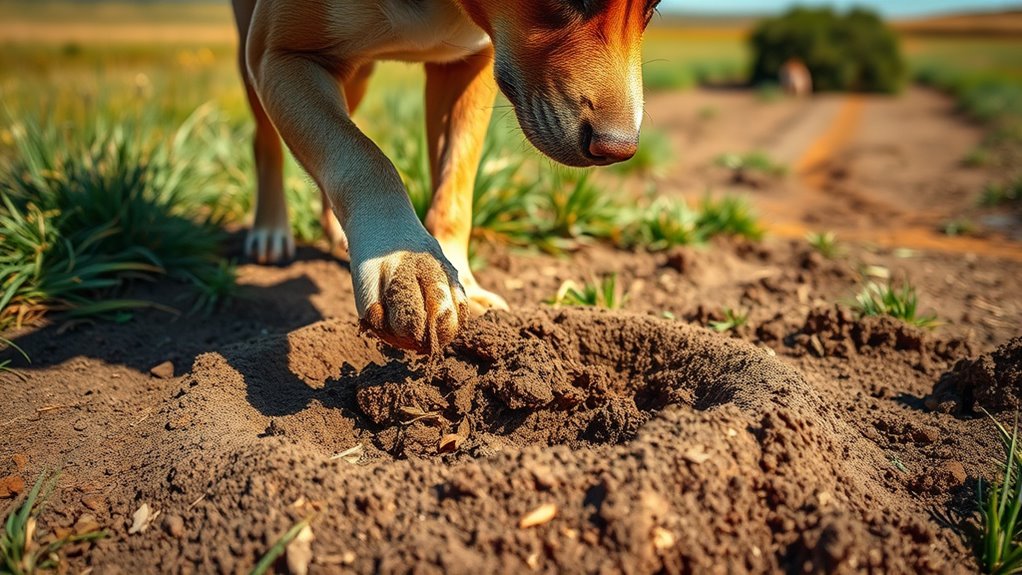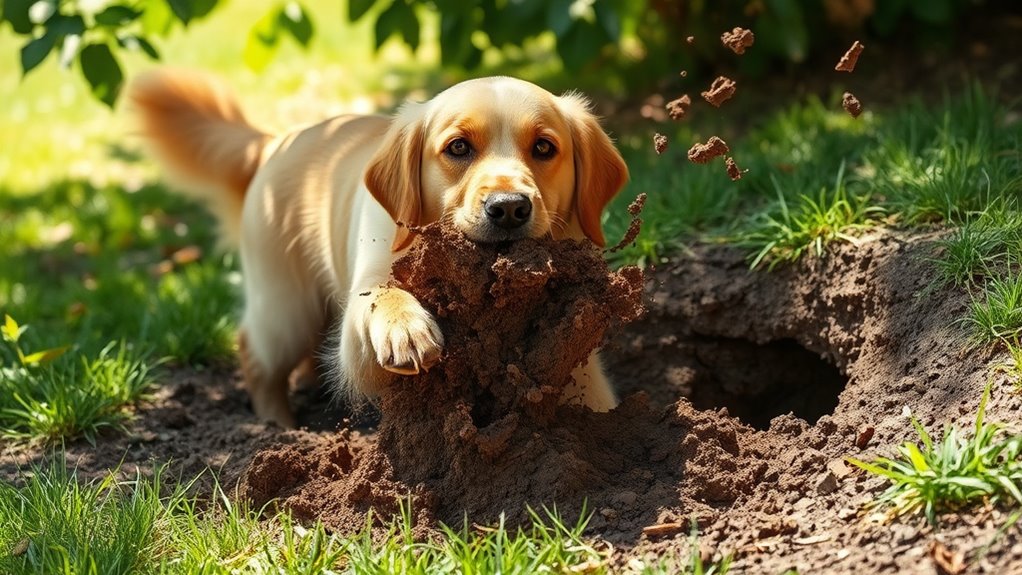Dogs dig holes for various reasons. It's instinctual behavior, especially in breeds like terriers. They might dig for entertainment, to stay cool, or seek comfort in different temperatures. Boredom or the desire for attention can also drive them to dig. Punishing or ignoring their digging usually doesn't help; instead, creating a designated digging zone and providing consistent training works better. If you want to explore effective strategies for managing this behavior, there's more to uncover.
Key Takeaways
- Dogs dig holes due to instinctual behaviors, especially breeds like terriers with a genetic predisposition to dig.
- Digging helps dogs release pent-up energy and satisfy their curiosity linked to natural hunting and burrowing instincts.
- Dogs may dig to create comfortable spots for temperature regulation, seeking cooler areas in hot weather or warmth in cold conditions.
- Attention-seeking behavior can lead dogs to dig, especially when they desire interaction or entertainment from their owners.
- Establishing a designated digging zone can channel this behavior positively, providing a safe space for exploration and play.
Reasons for Digging

When you notice your dog digging holes, it's important to understand the reasons behind this behavior. Dogs dig for various reasons, and it's often instinctual. Certain breeds, like terriers, have a natural urge to dig due to their hunting background.
If your dog is a puppy or young, they might just be releasing pent-up energy, especially if they aren't getting enough exercise or mental stimulation. Additionally, dogs might dig to find comfort, seeking cooler spots in hot weather or warmer areas when it's cold.
Sometimes, they dig to grab your attention; whether they're trying to engage you or just want a response, digging can be an effective way to get it. Understanding these motivations can help you address the behavior.
Entertainment Digging

Many dogs resort to digging as a form of entertainment, especially when they're left alone for long periods. Puppies and young dogs, brimming with energy, often dig to release that pent-up enthusiasm. Certain breeds, like terriers, may dig instinctively due to their genetic background. To curb this behavior, you can provide regular walks and engaging toys, ensuring they stay mentally and physically stimulated.
Creating a designated digging zone can also help redirect their energy into a constructive outlet.
| Tip | Benefit |
|---|---|
| Regular exercise | Reduces excess energy |
| Engaging toys | Keeps them mentally stimulated |
| Designated digging zone | Provides an acceptable digging area |
Hunting Behavior

Dogs dig not just for fun, but also as a natural instinct tied to their hunting behavior. When your dog digs, it may be trying to uncover burrowing animals like rodents or rabbits hiding in your yard.
Certain breeds, especially terriers, have a stronger prey drive and often engage in this behavior more intensely. You might notice focused digging around tree roots or shrubs, where these critters often reside.
It's essential to identify these areas and monitor your dog's digging habits, as this can lead to increased behavior if they sense prey nearby.
To manage this instinct, consider implementing humane exclusion methods or deterrents to minimize your dog's need to dig in search of hidden animals.
Comfort and Temperature Regulation

While hunting instincts drive some of your dog's digging, comfort and temperature regulation play a significant role as well.
Hunting instincts may motivate your dog's digging, but comfort and temperature regulation are equally important factors.
Dogs often dig to create a cooler spot in the ground during hot weather, as the earth below is typically cooler than the air. Conversely, in colder conditions, they may dig to find warmth, using the ground as insulation.
Here are some reasons your dog might dig for comfort:
- Cooler ground: Helps them beat the heat.
- Warm insulation: Protects them from the cold.
- Nest creation: Provides a sense of security.
- Breed tendencies: Some breeds with thick fur dig more.
- Temperature awareness: Monitoring their behavior can help manage their comfort.
Understanding these reasons can improve your dog's well-being.
Attention-Seeking Digging

Sometimes, a dog digs not just for fun or instinct, but to grab your attention. This attention-seeking digging often results in you inadvertently rewarding the behavior, even if you're scolding them.
To discourage it, you need to ignore the digging completely. Instead, focus on rewarding your dog for appropriate actions. Establishing consistent routines and engaging in daily interactions, like playtime and training, can help meet your dog's social and physical needs.
Escape From Boredom

When your dog's left alone for too long without stimulation, boredom can drive them to dig holes in search of entertainment. A barren environment without engaging toys or playmates makes this behavior more likely.
High-energy breeds, like terriers, are particularly susceptible to digging when they lack physical and mental exercise. To help alleviate this boredom, consider these strategies:
- Take daily walks of at least 30 minutes.
- Engage in interactive play sessions with toys.
- Incorporate short training sessions lasting 5-10 minutes.
- Provide puzzle toys that challenge their minds.
- Create a safe outdoor space with engaging features.
Additionally, establishing a budget plan for pet care can ensure you have resources for activities and toys that keep your dog entertained.
What Doesn't Work

When it comes to managing your dog's digging, some common approaches just don't cut it.
Punishing your pup often backfires, and ignoring the root causes can lead to even more digging.
Plus, inconsistent training methods won't help either; your dog needs clear expectations and proper outlets for their energy.
Punishment for Digging
While it might seem logical to punish your dog for digging, this approach often backfires. Punishment can confuse your dog and damage your relationship, leading to more anxiety and undesirable behaviors.
Instead of discouraging the digging, any attention—positive or negative—can reinforce the behavior. Here are some reasons why punishment doesn't work:
- Dogs may not connect punishment to the digging action.
- It can increase anxiety, making the behavior worse.
- Trust between you and your dog can be damaged.
- Consistent routines and positive reinforcement are more effective.
- Redirecting to a designated digging area can help curb unwanted behavior.
Focus on building a stronger bond with your dog instead of resorting to punishment.
Ignoring Behavioral Triggers
Ignoring the underlying triggers for your dog's digging behavior won't solve the problem; in fact, it can make it worse.
When you simply punish your dog for digging, you might be inadvertently reinforcing the behavior. Any attention, even negative, can serve as a reward.
If you overlook the need for proper physical and mental stimulation, your dog may dig out of boredom or excess energy.
Failing to recognize breed tendencies, particularly in digging-prone breeds like terriers, can lead to ineffective strategies.
Additionally, neglecting to provide a safe and engaging environment—like toys or playmates—may cause your dog to dig in search of entertainment.
Addressing these triggers is essential for effective behavior modification.
Inconsistent Training Methods
Inconsistent training methods can lead to confusion, making it hard for your dog to understand what you expect. This confusion can result in increased digging behavior.
Here are some pitfalls to avoid:
- Mixing positive reinforcement with punishment can unintentionally reward digging.
- Not establishing a routine may cause anxiety, prompting your dog to dig.
- Switching training techniques without clear communication leads to misunderstandings.
- Different family members giving mixed signals complicates your dog's learning process.
- Inconsistency in responses to digging behavior can reinforce unwanted actions.
Creating a Digging Zone

To keep your dog engaged and happy, create a designated digging zone in your yard, like a sandbox or a loose soil patch.
Bury some safe toys or treats there to encourage exploration and digging in that area.
If your dog starts digging elsewhere, use a loud noise to redirect them back to their special spot.
Designating Digging Areas
Creating a designated digging zone in your yard can greatly benefit both you and your dog. By providing a specific area for digging, you satisfy your dog's natural instincts while keeping your garden intact.
Here's how to create an inviting digging zone:
- Use loose soil or sand to make it comfortable for your dog.
- Bury safe toys to encourage exploration.
- Reward your dog with praise and treats for digging in the right spot.
- If they dig elsewhere, interrupt with a loud noise and redirect them.
- Consistency is key—be patient as your dog learns the new digging area.
Encouraging Exploration With Toys
While dogs naturally love to dig, you can enhance their experience by incorporating toys into the designated digging zone.
Start by creating a specific area in your yard with loose soil or sand that invites exploration. Bury safe toys or treats there to encourage your dog to dig in this spot rather than elsewhere.
When your dog digs in the designated area, reward them with praise and treats to reinforce this positive behavior. If they dig in unwanted areas, use a loud noise to interrupt them and redirect them to the digging zone.
To keep the excitement alive, regularly refresh the zone by rotating toys or adding new elements, ensuring your dog remains engaged and enthusiastic to explore.
Redirecting Unwanted Digging Behavior
Encouraging your dog to dig in a designated area can greatly reduce unwanted digging behavior around your yard.
To create a successful digging zone, follow these tips:
- Use loose soil or sand to make it appealing for your dog.
- Bury safe toys in the zone to entice them to dig there.
- Reward your dog with praise and treats when they dig in the right spot.
- Interrupt any unacceptable digging with a loud noise to redirect them to the digging zone.
- Regularly maintain the area to keep it interesting and engaging.
Next Steps for Managing Digging

To manage your dog's digging effectively, start by providing regular exercise; walking your dog at least twice daily helps burn off excess energy and reduces the urge to dig.
Create a designated digging zone in your yard with loose soil or sand, burying toys to encourage appropriate digging behavior.
When your dog digs for attention, consistently ignore this behavior and reward them for positive actions instead.
Engage your dog in play with active toys and interactive training sessions for about 5-10 minutes daily to alleviate boredom and lower the chances of digging.
Finally, monitor specific digging areas to identify patterns or triggers, enabling you to implement targeted solutions like humane deterrents for burrowing animals.
Frequently Asked Questions
What Does It Mean When a Dog Digs a Hole?
When your dog digs a hole, it might mean they're bored, seeking attention, or just following their instincts.
You might notice them digging to explore their surroundings or even to find a cool spot to lie down.
If you see this behavior, it's a good idea to provide more stimulation or playtime.
Additionally, understanding your dog's breed can help you know if digging is a natural tendency for them.
How Do I Stop My Dog From Digging Holes?
To stop your dog from digging holes, start by increasing their exercise.
Walk them twice daily to burn off excess energy. Keep boredom at bay with interactive toys and regular playtime.
You could also create a designated digging zone in your yard, filling it with loose soil and buried toys.
Make sure to ignore any attention-seeking digging, and reward your dog for positive behaviors instead.
Training classes can help redirect their focus as well.
Do Dogs Dig Holes Because of Anxiety?
Yes, dogs can dig holes because of anxiety.
When they're feeling stressed or bored, digging can become a way for them to cope.
If you've noticed your dog digging, it might be a sign that they need more mental stimulation and exercise.
Providing a consistent routine and a safe space can help ease their anxiety, reducing the urge to dig.
Make sure to engage with them regularly to keep those anxiety levels down.
What Breed of Dog Likes to Dig Holes?
You might be surprised to find that some dog breeds absolutely love to dig!
Terriers, like Jack Russells and Dachshunds, are natural diggers thanks to their hunting instincts.
Labrador and Golden Retrievers often dig for fun or to cool off.
If you've got a herding breed, like a Border Collie, they might dig out of boredom.
Even scent-driven breeds like Beagles enjoy digging to follow intriguing scents in the ground.
Conclusion
To sum up, dogs dig for various reasons, from boredom to basic instincts. By understanding their digging desires, you can create a constructive and comfortable environment. Consider crafting a designated digging zone to satisfy their instinctive urges while sparking their interest. Don't forget to engage them with entertaining activities to curb chaotic excavation. With patience and persistence, you'll promote positive play while preventing pesky problems. Embrace their energy and enjoy the journey together!









